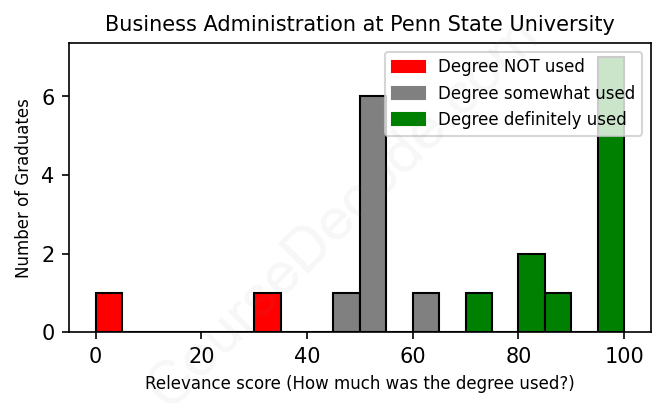
First, some facts. Of the Business Administration graduates from Penn State University we've analyzed , here's how many have used (or NOT used) their degree in their career:

These are estimates based on AI analysis of 21 LinkedIn profiles (see below).
The verdict? Slightly above average. Overall, with an average relevance score of 69%, Business Administration graduates from Penn State University have a slightly higher likelihood (+2%) of finding work in this field compared to the average graduate across all fields:
And for comparison, here's the chart for all profiles we've looked at across all degrees.
Also, after graduating, only 0% of these graduates have pursued further education other than another Bachelor's degree (such as a Masters degree or other), compared to the average across all profiles of 35%. This suggests a Bachelors degree is enough for most Business Administration graduates, and it's normal to look for work straight after graduation.
See the details:
|
Relevance score: 50% We think this person has gone into a career only somewhat relevant to their degree. We think this person has gone into a career only somewhat relevant to their degree.
DEGREE INFOGraduated in 2011 from Penn State University with a Bachelor of Science (B.S.) in Business Administration. No other secondary education since. JOB HISTORY SINCE GRADUATIONCustomer Service Advocate First Quality Jun 2011 - Present ABOUTNo information provided. |
The top 10 most common jobs done by the graduates we've analyzed (ranked most common to least) are:
Looking at the careers of Penn State Business Administration grads, it’s clear that a lot of them landed roles that tap into core business skills. Positions like Supply Chain Management, Sourcing Execution Specialists, and Marketing Directors are pretty common. These jobs generally revolve around applying the principles learned in their degrees, such as supply chain management, marketing strategy, and procurement processes. It’s a good mix that really shows how the curriculum can drive your career in specific fields like management, marketing, or operations.
However, there are also quite a few folks who strayed a bit from the strictly business track. You’ll find roles like Camp Instructor or Warehouse Manager where the connection to Business Administration is weak. Some of these jobs focus more on operational tasks without a heavy reliance on business knowledge. So, while many graduates are using their degrees in relevant positions, there are definitely cases where they're in roles that don’t exactly leverage their education. Overall, it's a mix of relevant applications and some outliers that don’t match up as closely with a Business Administration degree.
Here is a visual representation of the most common words in job titles for Business Administration graduates (this is across all Business Administration graduates we've analyzed, not just those who went to Penn State University):

So, if we look at the career trajectories of Penn State Business Administration grads, especially from the 2010s onward, it seems like a solid picture of success and relevance to their field. For their first jobs, many have taken positions in areas closely tied to business functions, like supply chain management, purchasing, and even human resources. A lot of them seem to land roles that not only kickstart their careers but also provide a solid foundation for growth in their respective industries. You can see individuals starting as analysts or assistants and moving up to managerial roles in just a few years. That upward mobility is a great sign!
Fast forward 5 to 10 years, and there’s a notable trend of these grads taking on more senior roles. Many are continuing in the business world, working their way up into managerial or consultancy positions. For instance, a bunch of grads from 2010 and 2011 have stuck with companies like Johnson & Johnson and Accenture, taking on progressively more significant responsibilities. While some have ventured into less traditional paths—like coaching or starting their own consulting businesses—the majority seem to be thriving in sectors relevant to their degree. Overall, these graduates appear to be on a solid career path that reflects well on their education at Penn State.
Getting a Bachelor’s degree in Business Administration at Penn State University, like at many schools, can be a mixed bag when it comes to difficulty. Generally, it’s not the easiest degree out there, but it’s also not the toughest. You’ll dive into a lot of subjects like finance, marketing, and management, and while some classes can be intense and require solid critical thinking and analysis, others are more straightforward. If you stay organized, keep up with readings, and engage in group projects, you’ll find it manageable. Just be prepared to put in the effort, especially during finals and big projects, but overall, it’s a solid program that challenges you without being overwhelmingly hard.
Most commonly, in the LinkedIn profiles we've looked at, it takes people 4 years to finish a Bachelor degree in Business Administration.
Looking at the career paths of these Penn State grads, it seems like they’re generally doing pretty well in terms of making decent money. Graduates from 2010 to 2022 have found jobs in strong companies like Boeing, Accenture, and Johnson & Johnson, and their roles have mostly moved up over time, which usually means better pay. For instance, the folks from 2011 and 2012 have moved into management positions, suggesting they're earning a good salary now. Even newer grads from 2023 seem to be landing solid roles at places like Amazon and FedEx, which are known for offering competitive salaries. So, while there are some roles that might not pay as much, overall, it looks like these Penn State alumni have a good shot at earning a respectable income.
Here is a visual representation of the most common words seen in the "about" section of LinkedIn profiles who have a Bachelor degree in Business Administration (this is across all Business Administration graduates we've analyzed, not just those who went to Penn State University). This may or may not be useful:

Here are all colleges offering a Bachelor degree in Business Administration (ordered by the average relevance score of their Business Administration graduates, best to worst) where we have analyzed at least 10 of their graduates: